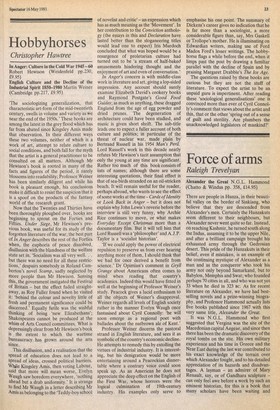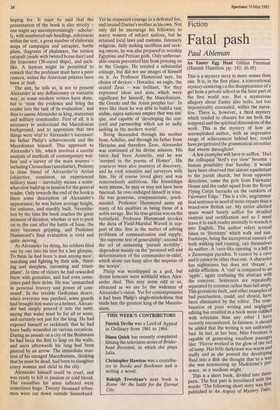Force of arms
Raleigh Trevelyan
Alexander the Great N.G.L. Hammond (Chatto & Windus pp. 358, £14.95) There are people in Hunza, in their beautiful valley on the border of Sinkiang, who believe that they are descended from Alexander's men. Certainly the Hunzakuts seem different to their neighbours, but Alexander never went quite so far. Instead, on reaching Kashmir, he turned south along the Indus, assuming it to be the upper Nile, and after a brilliant campaign brought his exhausted army through the Gedrosian desert. This pride of the Hunzakuts in their belief, even if mistaken, is an example of the continuing mystique of Alexander as a man and as the conqueror who took his army not only beyond Samarkand, but to Babylon, Memphis and Swat; who founded perhaps 70 cities in all, and who was not yet 33 when he died in 323 BC. As for recent literature on Alexander, we have had bestselling novels and a prize-winning biography, and Professor Hammond actually lists five books published since 1967 with this very same title, Alexander the Great.
It was N.G.L. Hammond who first suggested that Vergina was the site of the Macedonian capital Aegeae, and since then there has been the dramatic discovery of the royal tombs on the site. His own military experience and his time in Greece and the Near East during the last war contributed to his exact knowledge of the terrain over which Alexander fought, and to his detailed appreciation of its hazards and disadvantages. A layman — an admirer of Mary Renault, say, or of Gandhara sculpture — can only feel awe before a work by such an eminent historian, for this is a book that many scholars have been waiting and hoping for. It must be said that the presentation of the book is also strictly — one might say uncompromisingly — scholarly, with numbered sub-headings, references within the text, a great number of elaborate maps of campaigns and satrapies, battle plans, diagrams of phalanxes, the torsion catapult (made with twisted horse-hair) and the triaconter (30-oared ships), and suchlike. A layman might be permitted to remark that the professor must have a poor camera, unless the American printers have been at fault.
The aim, he tells us, is not to present Alexander in any deflationary or romantic way, as some modern writers have done, but to 'state the evidence and bring the reader into the task of its evaluation', and thus to assess Alexander as king, statesman and military commander. First of all, it is necessary to understand the Macedonian background, and to appreciate that two things were vital to Alexander's successes: his father Philip's achievements and the Macedonian himself. This approach to Alexander's life, which involves a careful analysis of methods of contemporary warfare and a survey of the main sources — including Cleitarchus (unreliable), Ptolemy (a close friend of Alexander's) Arrian (objective, consistent, an experienced military man) — inevitably means a somewhat slow build up in tension for the general reader. Only towards the end of the book is there some description of Alexander's appearance; he was below average height, for instance, and sturdily built. Nevertheless by the time the book reaches the great moment of decision, whether or not to push on to the east after the battle of Issus, the story becomes gripping, and Professor Hammond's final evaluation is vivid and quite moving.
As Alexander lay dying, his soldiers filed one by one into his tent for a last glimpse. To them he had been 'a man among men', marching and fighting by their side, 'thirsting and sleepless, carousing and triumphant'. In time of victory he had rewarded them with gratuities, and had even sometimes paid their debts. He was 'unmatched in personal bravery and power of com mand'. In the terrible Gedrosian desert, when everyone was parched, some guards had brought him water in a helmet. Alexander had simply poured it into the sand, saying that water must be for all or none, and certainly not just for the king. He had exposed himself so recklessly that he had been badly wounded on various occasions. During an assault on a city of the Brahmans he had been the first to leap on the walls, and soon afterwards his lung had been pierced by an arrow. The immediate reaction of his enraged Macedonians, thinking that he must be dead, had been to slaughter every woman and child in the city.
Alexander himself could be cruel, and was ready to kill in passion or cold blood.
The casualties his army inflicted were sometimes huge. Twenty thousand tribesmen were cut down outside Samarkand. Yet he respected courage in a defeated foe, and treated Darius's mother as his own. Not only did he encourage his followers to marry women of subject nations, but he retained local laws and customs. Intensely religious, daily making sacrifices and seeking omens, he was also prepared to worship Egyptian and Persian gods. Only unfavourable omens prevented him from pressing on to the Ganges. He created a substantial coinage, but did not use images of himself on it. As Professor Hammond says, his choice of devices — Heracles, an eagle, the seated Zeus — was brilliant, 'for they expressed ideas and aims which were significant for himself, the Macedonians, the Greeks and the Asian peoples too'. In ways like these he was able to build a vast, stable, supra-national empire that was unique, and capable of 'developing the concord and partnership which are so sadly lacking in the modern world'.
Being descended through his mother from Achilles, and through his father from Heracles and therefore Zeus, Alexander was convinced of his divine mission. His tutor had been Aristotle, and he was 'steeped in the poems of Homer'. His journeys were also journeys of discovery, and he took scientists and surveyors with him. He of course loved glory and was remorselessly ambitious. His friendships were intense, he may or may not have been bisexual, he over-indulged himself in wine. He was generous, compassionate, quickminded. Professor Hammond sums up many of his qualities as being those of a noble savage. But his true genius was on the battlefield. Professor Hammond invokes the dicta of Field-Marshal Wavell in support of this: first in the matter of solving problems of communication and supply, 'the supreme test of generalship': second in , the art of sustaining 'pursuit mobility', dependent mainly on the 'personal will and determination of the commander-in-chief, which alone can keep alive the impetus of the troops'.
Philip was worshipped as a god, but divine honours were withheld when Alexander died. This may seem odd to us, attracted as we are by the wideness of Alexander's vision. Yet for contemporaries it had been Philip's single-mindedness that made him the greatest king of the Macedonians.











































 Previous page
Previous page